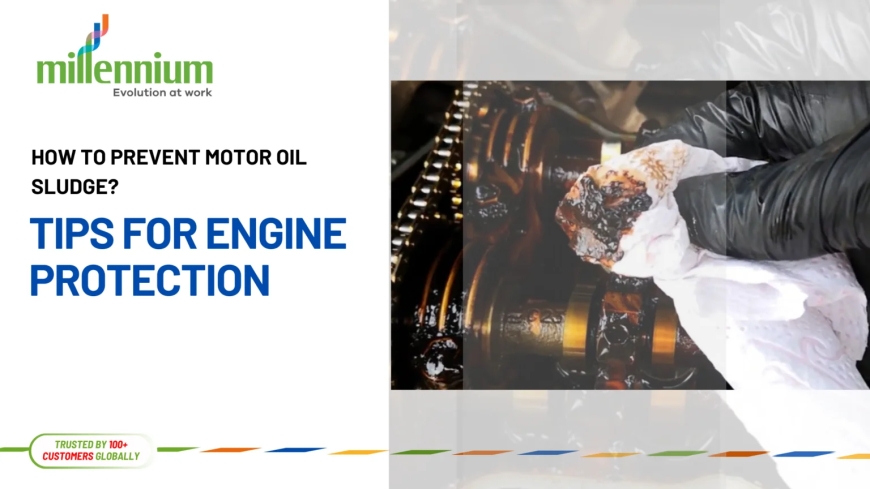How to Prevent Motor Oil Sludge: Tips for Engine Protection
Motor oil sludge is a serious issue that can shorten the life of your engine and reduce overall vehicle reliability.

Motor oil is the lifeblood of your engine, but over time, it can degrade and form a thick, tar-like substance known as motor oil sludge. This sludge can clog vital engine components, reduce performance, and lead to costly repairs or complete engine failure. Understanding the causes, symptoms, and prevention methods is essential for maintaining a healthy and efficient engine.
What is Motor Oil Sludge?
Motor oil sludge is a semi-solid deposit that forms when engine oil breaks down due to exposure to high heat, oxidation, and contaminants. Instead of flowing freely to lubricate engine components, sludged oil thickens and sticks to internal surfaces like the oil pan, valve covers, and oil passages. If left unchecked, sludge can block oil flow, increase friction between engine parts, and cause significant mechanical damage.
Sludge is more than just dirty oilits a chemical transformation that turns oil into a harmful residue. It typically accumulates in engines that experience infrequent oil changes, short driving cycles, or poor maintenance practices.
Common Causes of Motor Oil Sludge
Several factors contribute to sludge formation. Understanding these can help you take proactive steps to avoid engine trouble:
-
Infrequent Oil Changes
The most common cause is not changing the engine oil at recommended intervals. Old oil loses its protective properties and begins to oxidize, leading to sludge. -
Short Trips and Cold Starts
Driving only short distances prevents the engine from reaching its optimal operating temperature. As a result, moisture and fuel contaminants dont evaporate and mix with the oil, forming sludge. -
Poor Quality or Incorrect Oil
Using low-quality oil or oil not suited for your engine type (e.g., diesel oil in a petrol engine) can accelerate sludge formation due to poor thermal stability and additive breakdown. -
Overheating Engine
High engine temperatures can oxidize oil rapidly. Vehicles with cooling system issues or under heavy load conditions are more prone to sludge buildup. -
Faulty PCV (Positive Crankcase Ventilation) System
A malfunctioning PCV valve allows moisture and combustion gases to remain in the crankcase, promoting sludge development.
Signs of Motor Oil Sludge in Your Engine
Detecting oil sludge early can save your engine. Look out for these warning signs:
-
Engine Warning Lights: If the oil pressure or check engine light comes on, it could indicate restricted oil flow due to sludge.
-
Visible Sludge: Check under the oil capthick, dark deposits may be visible around the cap and valve cover.
-
Unusual Engine Noise: Sludge reduces lubrication, which may cause knocking or ticking sounds from the engine.
-
Reduced Fuel Efficiency: Poor engine performance due to clogged oil passages can lead to increased fuel consumption.
-
Overheating: Sludge buildup can block oil cooling pathways, leading to rising engine temperatures.
How to Prevent Motor Oil Sludge
Preventing oil sludge is simple with routine care and smart driving habits. Here are proven tips of prevent motor oil sludge:
-
Follow the Manufacturers Oil Change Schedule
Always adhere to the recommended oil change intervals in your owners manual. Modern engines often require changes every 5,000 to 10,000 km, but shorter intervals may be necessary for older cars or severe driving conditions. -
Use High-Quality Motor Oil
Choose premium oils that meet industry standards like API SN or ACEA A3/B4. For vehicles with diesel engines, use oils specifically formulated for diesel use, which offer better soot handling and oxidation resistance. -
Opt for Synthetic Oil
Full synthetic oils resist breakdown and perform better under extreme conditions, making them ideal for sludge prevention. They also offer better detergency to keep your engine cleaner. -
Warm Up Your Engine
Allow your car to reach full operating temperature, especially during cold weather. This ensures water and fuel contaminants evaporate instead of mixing with oil. -
Fix Leaks and Cooling System Issues Promptly
Oil contamination and overheating accelerate sludge. Repair oil or coolant leaks as soon as they appear and ensure your radiator and thermostat are in good working condition. -
Check and Replace the PCV Valve
A clean and functioning PCV system helps remove harmful gases and moisture from the crankcase, preventing sludge. Replace the valve every 30,000 to 50,000 km or as specified.
How to Remove Existing Motor Oil Sludge
If your engine already has sludge buildup, immediate action can prevent further damage. Heres what to do:
-
Engine Flush Products
Add a commercial engine flush additive to your oil and let the engine idle for a few minutes. These products help dissolve sludge and carbon deposits, which are then drained with the old oil. -
Multiple Oil Changes
Perform a series of short-interval oil changes using high-detergent oil. This gradually cleans the engine by flushing out sludge bit by bit. -
Professional Cleaning
Severe sludge may require a mechanic to manually clean engine components like the oil pan and valve train. This is more invasive but effective for heavy buildup. -
Inspect Oil Filter
Replace the oil filter with every oil change. A clogged or saturated filter can prevent oil from flowing freely and contribute to sludge recurrence.
Conclusion
Motor oil sludge is a serious issue that can shorten the life of your engine and reduce overall vehicle reliability. However, with proactive maintenancesuch as regular oil changes, using the right oil, and keeping engine systems in top shapeyou can effectively prevent sludge from forming. Diesel engines especially benefit from specially formulated diesel engine oils that resist soot and heat degradation. Stay consistent with your engine care routine, and your vehicle will reward you with smooth performance and long-term durability.































